Acer V7-482PG-9884 Review: Everything You Need
by Jarred Walton on August 24, 2013 12:00 AM ESTAcer V7-482PG General Performance
We’ll start with the usual selection of system benchmarks to show how the V7 handles everyday tasks. I don’t have a full set of results for some things, but let me just start with some general OS numbers. The V7 boots reasonably quickly – 23 seconds from power on – and it resumes from hibernate faster – around 15 seconds. Shutdown/hibernate times are typically 11-13 seconds, but unless you need to make sure the system is off before walking away/stowing it in a bag, or if you’re rebooting, I don’t find the time to shut off/hibernate to be particularly important. The boot times are definitely one area where Windows 8 has greatly improved over previous versions of the OS.
Moving on, before we get to the graphs I want to provide a quick overview of our comparison points. As usual, you can find all of the benchmark results for the V7 in Mobile Bench, along with previously tested laptops, so you can always make your own comparisons. Our selection of laptops this time is a bit more varied, as the V7 is both an Ultrabook as well as a potential gaming laptop. From the Ultrabook side of things, this is actually our first full review of a Haswell Ultrabook, so we have to return to Ivy Bridge for most of these comparisons. I’ll include the numbers that we have from the Acer S7-392 preview, but it’s not in all the charts; I’ll also include the Acer R7, Clevo W550EU, HP Spectre XT TouchSmart, and Toshiba KIRAbook. From the gaming side, we’ll include the MSI GE40, MSI GX60, MSI GT70, and the Razer Blade 14; all of these are higher-end gaming notebooks that don’t necessarily compete directly with the V7, but it’s sometimes useful to see what you give up – or in some cases don’t give up – in performance.
| Overview of Comparison Laptops | ||||||
| Laptop | CPU | GPU | Storage | RAM | LCD | Battery |
| Acer R7-571-6858 | Intel Core i5-3317U | HD4000 | 500GB HDD + 24GB SSD | 1x4GB + 1x2GB | 15.6” 1080p Glossy AHVA Touchscreen | 4-cell 54Wh |
| Acer S7-392-9890 (Preview) | Intel Core i7-4500U | HD4400 | 2x128GB RAID 0 SSDs | 2x4GB | 13.3” 1080p Glossy IPS Touchscreen | 4-cell 46Wh |
| Acer V7-482PG-9884 | Intel Core i7-4500U | GT750M DDR3 / HD4400 | 1TB HDD + 24GB SSD | 1x4GB + 1x8GB | 14” 1080p Glossy AHVA Touchscreen | 4-cell 54Wh |
| Clevo W550EU (Mythlogic) | Intel Core i5-3340M | HD4000 | 256GB SSD | 2x4GB | 15.6” 1080p Matte IPS | 6-cell 62-Wh |
| HP Spectre XT TouchSmart | Intel core i7-3517U | HD4000 | 500GB HDD + 32GB SSD | 2x4GB | 15.6” 1080p Glossy IPS Touchscreen | 4-cell 48Wh |
| MSI GE40 | Intel Core i7-4702MQ | HD4600 / GTX760M | 128GB SSD + 750GB HDD | 1x8GB | 14” 1600x900 Matte TN | 6-cell 65Wh |
| MSI GT70 Dragon | Intel Core i7-4700MQ | HD4600 / GTX780M | 128GB SSD + 750GB HDD | 4x8GB | 17.3” 1080p Matte TN | 9-cell 87Wh |
| MSI GX60 | AMD A10-5750 | HD8650G / HD7970M | 750GB HDD | 1x8GB | 15.6” 1080p Matte TN | 9-cell 87Wh |
| Razer Blade 14 | Intel Core i7-4702HQ | HD4600 / GTX765M | 256GB SSD | 2x4GB | 14” 1600x900 Matte TN | 6-cell 70Wh |
| Toshiba KIRAbook | Intel Core i7-3537U | HD4000 | 256GB SSD | 2x4GB | 13.3” 2560x1440 Glossy IPS Touchscreen | 4-cell 52Wh |
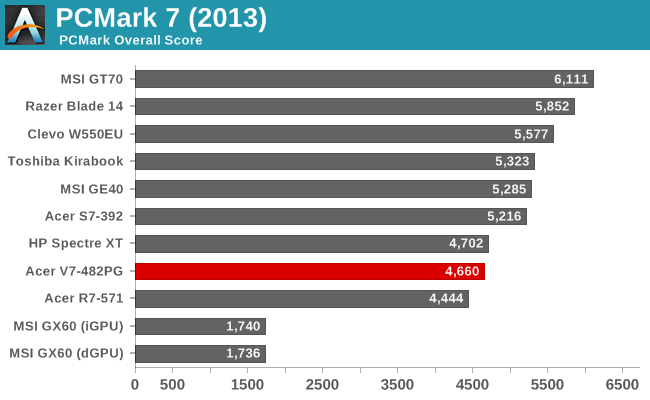
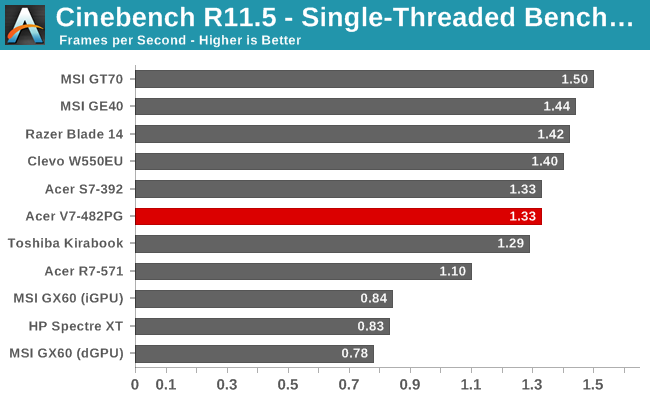
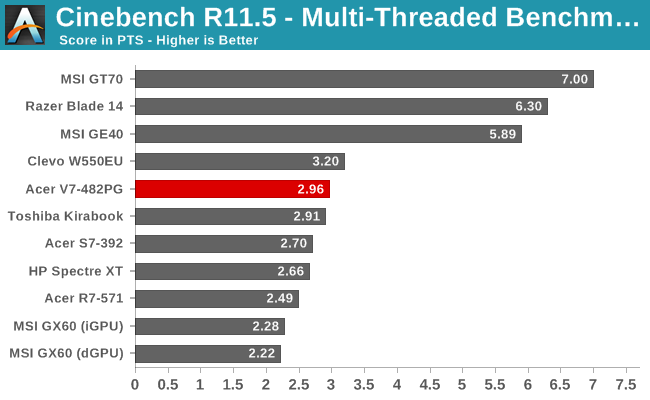
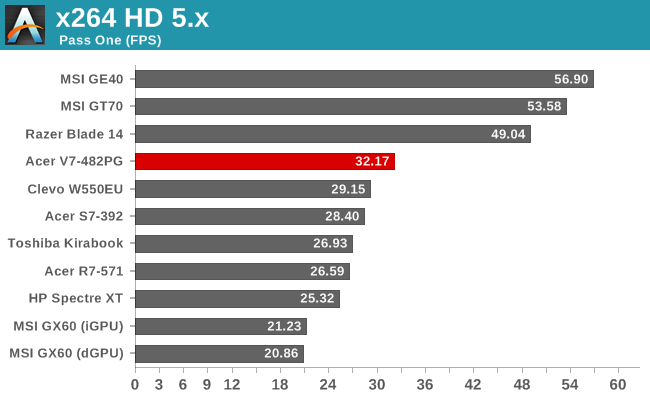
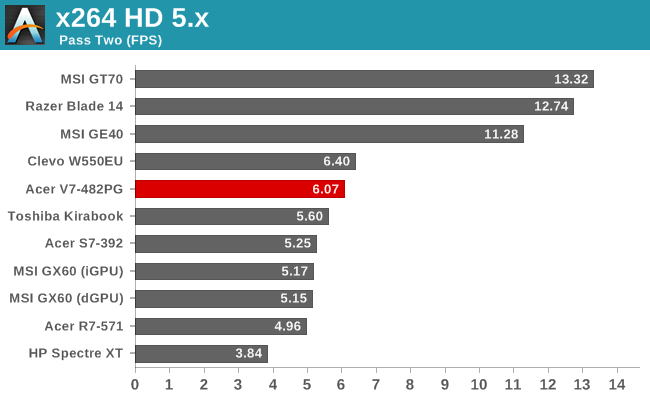
Starting as usual with PCMark 7, obviously the MSI GX60 is seriously penalized by not having a solid state drive. The rest of the systems all come together, with quad-core SSD systems at the top, followed by the dual-core SSD systems, and bringing up the rear we have hybrid SSD + HDD laptops like the Aspire V7. Personally, I find that hybrid storage feels a little closer to pure HDD than it does pure SSD, and benchmarks like PCMark 7 tend to paint a rosier picture than reality. Still, hybrid storage is far better than not having any solid state storage at all. For general use, the fact is that just about any modern system is more than fast enough – and other than a few specific use cases, a solid state drive doesn’t make your system two or three times faster, but it’s still definitely something I want to have in any modern system.
Our next set of performance benchmarks put more of the strain on the CPU, and here we see something that most of us already expected: Haswell isn’t substantially faster than Ivy Bridge. It seems like cooling and thermal throttling (or in other words, bios and firmware optimizations) can have a larger impact on performance than the choice of CPU. For example, the Toshiba KIRAbook and HP Spectre XT have virtually the same Core i7 Ivy Bridge CPU, but the Spectre XT ends up being substantially slower. In terms of where Haswell sits, the i7-4500U comes out ahead of all of the Core i7 ULV Ivy Bridge CPUs, but the difference ranges from a negligible 2-3% in Cinebench to a slightly more noteworthy 8-20% in x264 HD. How much of the difference in x264 is from IPC improvements and how much of it is just a question of BIOS/firmware differences is difficult to say – keep in mind that the Acer S7-392 has the same CPU, so firmware is probably the bigger factor.
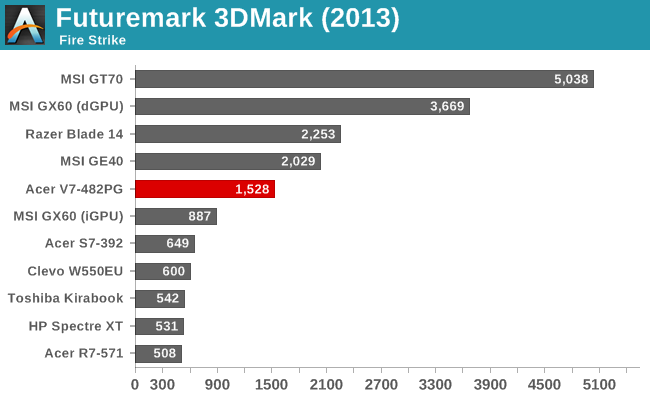
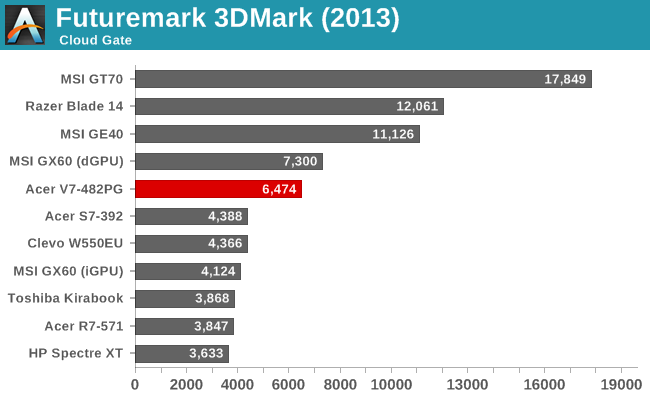
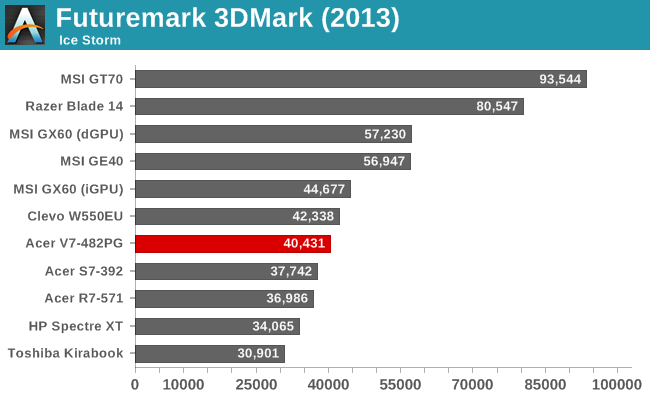
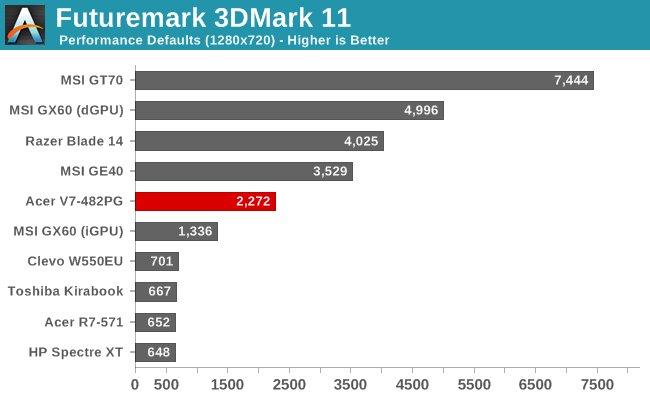
In terms of graphics performance, using 3DMark as our baseline estimate, there’s clearly a pecking order established: high-end GTX and HD 7900 GPUs, moderate GTX 760 GPUs, the GT 750M used in the V7, AMD’s Richland/Trinity iGPU, and then all of the Intel integrated graphics solutions. I’m still surprised that the GT2 implementations of Haswell haven’t really improved over the GT2 Ivy Bridge iGPU, but variations in clock speed certainly play a role. We should also be getting our first Crystalwell (Haswell GT3e) laptop in the next week, which of course will improve performance quite a bit but at a pretty hefty price. Depending on how much OEMs have to pay NVIDIA for something like the GT 750M, and considering the lack of GT3e on dual-core parts, I suspect we might end up waiting for Broadwell for a truly compelling mainstream iGPU from Intel.
And with that said, let’s move on to gaming benchmarks.










62 Comments
View All Comments
tackle70 - Saturday, August 24, 2013 - link
I guess I'm just a computing dinosaur... I do almost all my work on desktops, and while I love a laptop as a backup portable work/netflix/whatever box, I just can't stomach the thought of spending $1k+ on one.My 2.5 year old $450 HP Probook 4430s may have a fugly screen and not be the thinnest or fastest thing out there, but I can't see replacing it anytime soon for how I need to use a laptop.
Impulses - Sunday, August 25, 2013 - link
Guess that makes me a bit of a dinosaur too... Or just a geek and a gamer, I've been thinking of getting a laptop for a while to replace an aging netbook but between my desktop and my tablet I tend to use the netbook a whole lot less than I used to...And I wouldn't be happy with a budget laptop (let alone another netbook) if it weighed half a dozen pounds or had a crap screen (not after getting 3x24" IPS displays for the desktop and looking at the new Nexus 7 display...). Work needs might eventually force my hand tho, and while I'd like a system like this Acer I'd probably opt for something slightly cheaper/lighter without a dGPU.
et20 - Sunday, August 25, 2013 - link
Good review. Thank you.Please stop saying "the only company that can get away with charging Apple prices is Apple".
It's stupid and insulting.
It's insulting to Acer and the other manufacturers to imply that they don't deserve proper margins for developing good products.
It's insulting to consumers to imply that most of them are not discerning enough to pay what a good product is worth.
It's insulting to Apple to imply that they somehow "get away" with making more than subsistence profits for building good products.
It's insulting to Apple product users to imply that they're been fooled into paying more than rock bottom prices for good products.
So just stop with this BS and admit that Mac and PC hardware offer largely the same value for money.
JarredWalton - Sunday, August 25, 2013 - link
You can say "it's insulting" all you want, but that doesn't make it true. The reasons for why Apple can charge more are numerous, but just to cover a few:1) Brand recognition
2) Good products
3) Unique OS
4) An ecosystem that many users like
I don't personally like Apple products enough to own them, other than an iPod Touch I got from work, but they do get plenty of things right. There is however no question that Apple charges a significant premium on their products; the old joke is "everyone buys two, so if you have a problem the first replacement is free, no questions asked." To suggest that they're "largely the same value for money" is stupid and insulting to anyone that can do math. Let me go over it again:
MacBook Air 13: $1300, Acer V7-482PG-9884: $1300
On the Apple side:
Build quality: minor win for Apple; let's be generous and call it $100
256GB SSD: $100 more than 24GB + 1TB HDD
Thunderbolt: $50 (again, being more than generous)
+$250 relative value
On the Acer side:
Better 1080p AHVA LCD: $75 more than 1400x900 TN
Touchscreen: $100 extra
Faster i7 CPU: $150 more than i5-4250U
GT 750M: $100 add on
+$425 in relative value (BoM costs)
So right there, with some math that's very kind to Apple, we have at least a $175 additional profit margin for the MacBook Air 13 (upgraded model). If we were to go through all of the components for both laptops and figure out a realistic BoM, I figure Apple's total profit margin on the upgraded MBA13 is roughly twice what Acer makes off the V7-482PG. And yet, Apple will sell 10X or maybe even 100X MBA13 as Acer will of the V7-482PG.
Oh, but to suggest that Apple can charge more because they're Apple is stupid and insulting. I forgot.
teiglin - Sunday, August 25, 2013 - link
It's a bit silly to add after Jarred's clear (and snarky) response, but any discussion of "value" has to bear in mind that many factors that influence value are subjective. On the Apple front in particular, I was in the market for a 13" laptop recently and strongly considered the MBA, thanks largely to touchpad quality, plus the unique availability of HD5000 vs. HD4400 in all the available ultrabooks. However, for me, shipping OSX is mostly a downside--it adds the cost of a Windows license to my purchase, not to mention a nonstandard keyboard layout under Windows.So value is in the eye of the beholder. The fact that Macs have higher profit margins than most Windows boxes is not an insult to Mac users; it just means that Mac users are willing to pay more money for less hardware, in order to get the other benefits of owning a Mac. Life would be simpler if Apple fanboys (really, fanboys of all stripes) would be a little less touchy about perceived attacks on themselves or their company.
Impulses - Wednesday, August 28, 2013 - link
To me, the only strong value proposition involved with a Macbook is the fact that after 2-3 years of use someone's likely to pay me 2-3x for it what an equivalent Windows laptop PC would be worth at that point... Resale value's not enough of a reason for me to deal with bootcamp etc tho. They're nice systems and all, just not for me.I'm not sure when companies started deserving higher margins or not or howthis somehow became a moral issue... Brand recognition and PR (backed up by solid build quality) sells and can easily inflate a product's worth, don't be naive and try to pretend otherwise.
ananduser - Sunday, August 25, 2013 - link
There is no shame in charging extra for the brand. If you truly believe that your company makes premium products, then you must price accordingly. You may buy macs for their technical nuances and exclusivities, but I'm afraid you're in the minority. So, unless you need OSX, you're relatively paying more for less; Jarred above me is right.joe_dude - Monday, August 26, 2013 - link
The Canadian model of the V7 is far better in terms of price point. As for Apple, they will always be "pay more for less". Also, battery life would last longer if the extra diagnostics were turned off, since Windows continually writes that info to disk. It's for enterprise/network use (which is something Apple doesn't have to worry about).dareo - Monday, August 26, 2013 - link
Is it possible to easily swap out the 24GB SSD Cache on this model with a Samsung 840 EVO 256GB SSD, using it as the primary drive for the OS and apps, and reserving the HDD for documents?JarredWalton - Monday, August 26, 2013 - link
From the hardware side, it's easy. On the software side, you'll basically want to do a clean install of the OS and you wouldn't want ExpressCache running as you would have no need for it. For most of our readers, I'd guess doing a clean Win8 install is simple enough, particularly if they're willing to open up the laptop and replace the mSATA drive in the first place. :-)